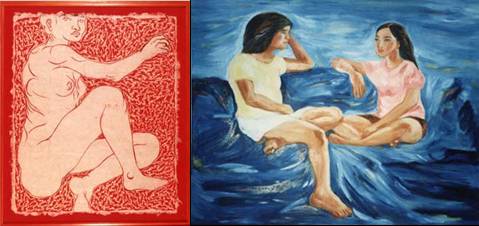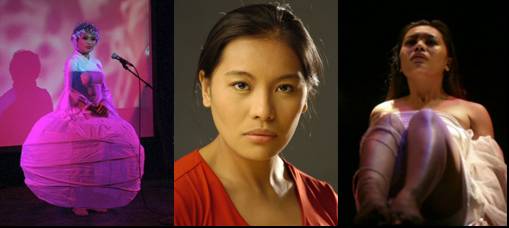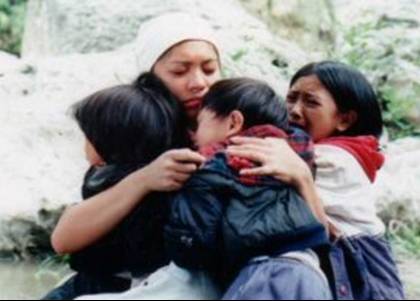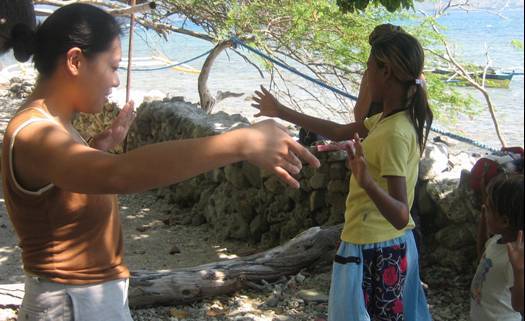Filipina opera singer Banaue Miclat, supernumerary at the Met, is a torrent of positive energy. She speaks about her diverse work as an actor, singer, dancer, and child advocate with the same level of enthusiasm, bubbling with infectious laughter and optimism. One could hardly guess the tragedy she has overcome to achieve her success.
Banaue was born in China in 1979. Her politically active parents felt unsafe under the regime of Ferdinand Marcos in the Philippines. They moved to China in 1971 to study and begin their family. In 1986, martial law in the Philippines was lifted and Marcos was removed from power. The family returned to their homeland where Banaue studied the performing arts, with an early focus on ballet.
From a very young age, Banaue demonstrated a riveting talent on the stage. Only 12 years old, she starred as Sita in the Philippine Educational Theater Association's production of the Indian epic "Ramayana." For the role, she had to do it all -- sing, dance, and act -- early signs of her versatility.
She studied theater arts at the prestigious University of the Philippines from 1996-2000. By the age of 20, Banaue was a star of Filipino theater, television, and film.
Banaue was always inspired by her older sister, Maningning, whose own precocious artistic talent was expressed through poetry and painting. The senior Miclat sister published several volumes of writing and her visual art was displayed all over the world. Like Banaue, her work displayed a depth of maturity beyond her years.
"Maningning taught me to channel pain and adversity into my work," explains Banaue. "Every time I had a difficult experience she told me to think of it as something that will help me with my acting."

"Defining Her (Red)" and "Friends" (Maningning Miclat).
Like so many artistic spirits, Maningning Miclat struggled with her own dark personal demons, but no one knew how powerful they were. In 2000, her career surging, she shocked her family and the Filipino cultural community by committing suicide.
Banaue describes the confusion and numbness of the time that followed. "I wasn't able to cry for two years. I immersed myself in work. In the three months following her death, I choreographed two musicals, acted in one play, two movies, and a soap opera. Maybe all the activity saved me"
Another coping mechanism for Banaue was founding the Maningning Miclat Art Foundation with her parents. The non-profit foundation provides financial assistance to young aspiring artists. Banaue has headlined several fund-raising performances in her sister's honor, with the largest gala set to take place this coming September.  The many moods of performer and child advocate Banaue Miclat.
The many moods of performer and child advocate Banaue Miclat.
But even with such altruistic distractions, Banaue still struggled with the memory of her sister. Reminders of her were everywhere in her daily life. In 2004, she made the decision to leave her secure career in the Philippines and study abroad. She was accepted into several prestigious academies and selected the Master of Fine Arts program in Acting at Brooklyn College.
Almost immediately following the program's conclusion in 2006, a voice teacher told Banaue that she had the talent for opera singing if it was something she wanted to pursue. "Opera immediately felt natural to me," Banaue explains. "More natural than any singing I had done before. The discipline and challenge of the art form appealed to me."
Just weeks into studying her new craft, Banaue was at the Metropolitan Opera Company at Lincoln Center (the Met), auditioning for supernumerary, a position that requires acting, dancing, and an advanced understanding of opera.
"When I was selected as a Met supernumerary, so quickly after I had begun studying opera, I took it as a sign. Opera was to be the new center of my universe."
The life of a supernumerary is never dull. In her first production with the Met, Banaue played a bear wrestler, death, and a lunatic -- all in the same show. The elaborate costume changes and choreography did not faze the seasoned professional, and officials at the Met asked Banaue to stay on indefinitely.
She has since performed in almost a dozen Met productions including La Boheme (Puccini), La Triviata (Verde) and Salome (R. Strauss). She is a member of the American Guild of Musical Artists (AGMA).

Banaue stars in the 2003 independent film, Abong: Small Home.
Banaue is the rare human being who seems to get 25 hours out of every day. During these past few years at the Met, she has also starred in several off-Broadway shows, maintained her rigorous study of opera, and still managed to find time to mentor aspiring actors and filmmakers at the New York Film Academy (NYFA) in the summers of 2005 and 2006.
Cylinda Whitted, co-worker, witnessed the unique bond between Banaue and the students. "Banaue is a compassionate woman," explains Cylinda. "I don't know what kind of pixie dust she sprinkled on those kids, but she was the only counselor to have student films dedicated to her."
Banaue stays connected to the bevy of Filipino film and musical directors in New York. She travels continually between Manila and New York. Moving between the two worlds lends Banaue a unique perspective.
"I am disappointed by the lack of roles for a female Asian on Broadway," she muses. "I believe in a color-blind aesthetic where you might find a Korean performing in the role of Aida. We cannot all audition for Miss Saigon."
Banaue is that rare multifaceted artist working in several disparate genres simultaneously. Like her older sister, she writes poetry, some of which can be found on her website. One particular poem spoke to me: "Sculptor."
I tasted the salt of your sun-soaked skin And I thought that love is an illusion. I stared at your unflinching brown eyes And I recognized the truth that's merely a hallucination. Till the splash of cold sea-water woke me up And sand sprinkled on my lips. My eyes were blinded by the sun And I realized that you are the illusion.
Not yet 30, Banaue is determined to help other children from third world countries achieve success similar to her own. In New York, she has volunteered with my organization, Orphans International Worldwide, helping me emcee a recent event at the Harvard Club.
"What I want to bring poor children, beyond food and shelter, is an appreciation for the arts," she explains. "For me, art represents the soul's salvation, especially in this materialistic world. Art helps to ground you and make you aware of the deeper connections possible with others. As Maningning taught me, art has the potential to make you a better human being."
Edited by Ethel Grodzins Romm

